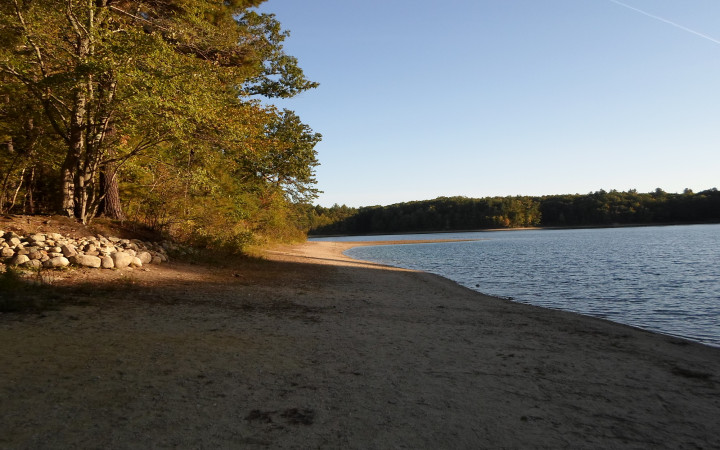Today’s Wonder of the Day was inspired by Christie from Maynard, MA. Christie Wonders, “Who was Henry David Thoreau?” Thanks for WONDERing with us, Christie!
People are so connected today. We can always reach each other. We talk through text, email, and social media. This has its benefits—it’s much easier to keep up with friends and family. However, it’s also hard to get any alone time. Do you ever want to just escape?
Henry David Thoreau often felt the same way. To fix the problem, he built his own log cabin in the woods. Twice during his life, Thoreau lived in his log cabin. He was there alone for two years at a time. He lived off the land and nearby Walden Pond. Thoreau also studied nature and wrote some of his best work at the cabin.
Thoreau was born in 1817 in Concord, Massachusetts. His family had a business that made pencils. Thoreau worked for the family business for most of his life. He was also a teacher for two weeks. Does that sound like a short school year? Well, the school year was much longer than Thoreau’s teaching career. He didn’t like the school’s discipline style. That’s why he left the job so quickly.
Obviously, that wasn’t the end for Thoreau. He went back to making pencils. He also built a friendship with his neighbor, Ralph Waldo Emerson. Emerson was a writer and philosopher. He had a big impact on Thoreau. When Thoreau built his log cabin, it was on Emerson’s land near Walden Pond.
While living in the cabin, Thoreau wrote his first book. He dedicated it to his brother, John. It was called A Week on the Concord and Merrimack Rivers. During this time, Thoreau also spent one night in jail.
Was Henry David Thoreau a criminal? Well, that depends on who you ask. Thoreau strongly disagreed with slavery, which was still legal in the United States during his lifetime. In protest, he didn’t pay taxes. This earned him a night in jail.
While in jail, Thoreau wrote an essay titled “Civil Disobedience.” In it, he explained his actions. Thoreau believed it was his duty to stand up to unjust laws. This later inspired civil rights leaders such as Gandhi and Dr. Martin Luther King, Jr.
Thoreau fought slavery for the rest of his life. He wrote and spoke often in favor of abolition. Thoreau also helped speed enslaved people to freedom along the Underground Railroad.
Nature was another one of Thoreau’s passions. He often took long walks next to Walden Pond. He wrote about the plants and animals he saw. His most famous book, Walden, was about his time living on the pond. Even after he left his cabin in the woods, Thoreau took a daily nature walk. He filled journals with his observations. Today, he's remembered as one of history's great environmentalists.
Along with his friend Emerson, Thoreau became one of the best-known transcendentalists. Transcendentalists focused much of their thought on self-reliance and spiritualism. They wanted to rise above materialism and other societal ills.
How would you like to live in a cabin in the woods? Would you enjoy getting away for the rest of the world? The experience definitely isn’t for everyone! However, you might find you like it, as Thoreau did. Disconnecting from society and focusing on nature could give you a whole new perspective.
Standards: C3.D2.Civ.12, C3.D2.His.2, C3.D2.His.3, C3.D2.His.4, C3.D2.His.5, CCRA.L.3, CCRA.L.6, CCRA.R.1, CCRA.R.2, CCRA.R.10, CCRA.W.1, CCRA.W.2, CCRA.W.7, CCRA.W.9, CCRA.L.1, CCRA.L.2, CCRA.SL.1, CCRA.SL.2,




